The path of your life can change in an instant. Paul Bradley’s did.
Part of Tom Scullion and Jim McKeever’s Derry senior football panel who were preparing to face Tyrone in the summer of ’86, the Faughanvale man turned sharply during a training game at Greenlough. He had been riding the crest of the wave of top level Gaelic football for over three years when the jarring knee movement saw his body crumple, and his anterior ligament ripped unmercifully apart between two pieces of bone.
What followed is one of the most heroic, yet largely untold stories in Derry’s GAA circles. It’s not the heroism of the bright lights, the media click, click, click, and the dramatic gesture. Instead, it’s got longevity and an altruistic heart, more akin to the definition espoused by the former tennis great and social activist, Arthur Ashe: “True heroism is remarkably sober, very undramatic. It is not the urge to surpass all others at whatever cost, but the urge to serve others at whatever cost.”
Bradley’s path may have been altered on a May evening in 1986, but his destination remained stoically static.
*****
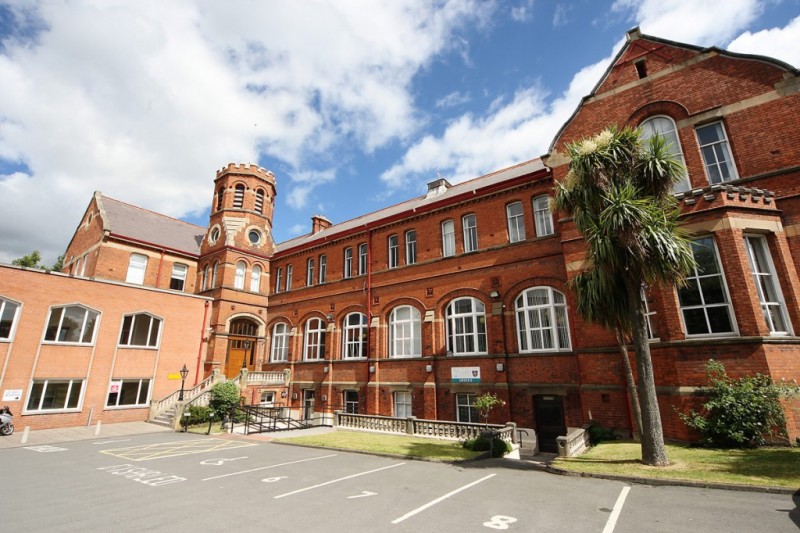
The ghosts of forty years of Ranch footballers companied Paul Bradley as he sat alone with his thoughts in the old Georgian mansion that was Trench House. It was west Belfast in early 1989 and Bradley’s knee was, not for the first time, in total agony.
“We had no mobile phones or social media back in those days,” he reflects now, just over twenty-eight years later. “So I was waiting patiently on the rest of the lads coming back to see how the game had finished.”
One hour earlier Paul Bradley had been playing in ‘the game’. It was the Sigerson Cup quarter-final of 1989, with the trainee teachers of St Mary’s up against University College Galway. Given what he had gone through during the previous three years, to this day, Paul Bradley isn’t quite sure how he had got back to a starting role with the Sigerson panel. But he had. Picked at corner back verses a hotly fancied Jordanstown team in the preliminary round, the young Derry man was again selected in the same position for the Galway game. He recalls being ‘clattered by a brute of a corner forward’ about twenty minutes in. He knew it was the end of an era yet his thoughts sitting there in the dormitory room were of events ongoing and the fate of his team-mates.
“We had a very small panel within a college completely dominated by girls,” Bradley recounts of his St Mary’s days. “It meant that if you lost a couple of players you were down ten or fifteen percent. To do what we did that year was a fantastic achievement, the same as what was achieved this year.”
Bradley is referring of course to the results of the class of 2017, expertly guided by Paddy Tally; recent events which resonated strongly within his own still tightly knit group of men.
Semi-final victory over Queen’s pitched ‘The Ranch’ against UCC in the final, just two years after they had been admitted into Sigerson football. “Maurice Fitzgerald was the big name for them,” says Bradley. “But we beat them comfortably.” And 3-13 to 1-05 is a comfortable score line in anyone’s language. It had been achieved, like 2017, with a small, tight knit group of players with some outstanding individuals in a David vs Goliath encounter.
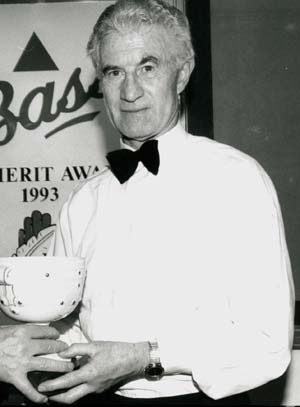
Playing alongside Paul Bradley among the Oakleaf ranks of the Ranchers in ’89 was Seamus Downey and Danny Quinn. They were joined by Paddy Barton and Conrad McGuigan, who still works ‘next door’ to Bradley in Trench Road P.S. in Derry, as well as now household names like Jarlath Burns, John Rafferty, Iggy Gallagher and Malachy O’Rourke. They may have been small in number but they were big on talent and even bigger of heart.
Providing the glue was Jim McKeever, the very definition of the term ‘class act’. McKeever made a big impact on the young trainee teacher from Faughanvale. “When Jim spoke, everybody listened,” says Bradley. “He was someone you looked up to. He just commanded respect, for what he had achieved himself as a player but also for the way he carried himself, his diligence and his knowhow.”
If McKeever had been the footballing authority behind the college’s maiden Sigerson triumph, then another man, according to Bradley was ‘the driving force’. “Peter Finn, at the time, was a novice in Gaelic football,” he says. “He was an athletics coach. We were fairly rudderless up until Peter’s arrival. We didn’t have a really recognised coach as such. He had a great head on him, with a great knowledge of how to coach and get guys fit, and more importantly, I suppose, how to motivate lads. He gave us a focus with a sense of camaraderie and commitment, a will to succeed. Jim was the brains behind it but Peter was very much the driving force.”
Useful attributes for a man who would go on to become Principal of the college itself.
Having come through his first year at St Mary’s, Paul Bradley’s footballing lifeline hung in the balance. The injury, suffered training with the Derry senior team in May 1986 hadn’t healed and he was unable to take much part in any sport, let alone top flight Gaelic football.
“I didn’t play any in second year,” he reveals. “It took me a year to fill the gap. It was very hard. In second year at college I had no involvement with the game. I was a bit like a lost soul, probably took to drink like a typical student. In third year I became chairman of the club [at St Mary’s] and that got me involved again.”
It was Finn’s prompting, however, which ultimately convinced Paul Bradley to give it one more shot.
“I thought ‘to hell with it, it’s my last year of college. I’m going to give it a go.’”
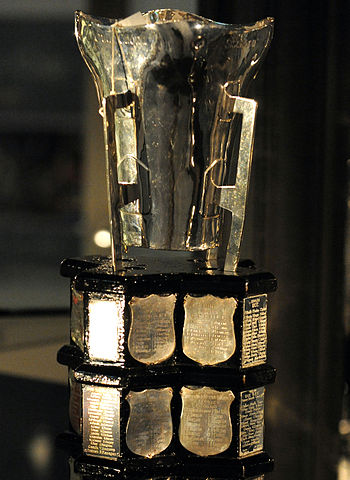
Looking back on his decision he now sees the inevitable ending. He had done the training and competed in the challenge games. There was always a lingering ‘but’.
“There was no great science behind it,” he says of his attempted rehab. “There was none of the strength and conditioning programmes that you have nowadays. It was basically me doing my own thing. I probably wasn’t building up the right muscles, or building them up enough.”
Having gained the number 24 jersey for the ’89 Sigerson campaign, Bradley had added to his glittering medal collection. He also added a lifetime of social network.
“I remember the night of the reception in the guildhall in Derry in 1993,” Bradley recalls fondly. Seamus (Downey) came out and stayed in my house that night. We partied all night that night! And we keep that contact yet. You know in Derry GAA circles, you meet the likes of Danny Quinn at matches. It’s always great to see those fellas again.”
A 25th anniversary event was held in 2014, but it was an altogether more poignant meeting which took place on 13th August 2011. Cairde Catherine, held at Seán Brown Park in Bellaghy, was a charity GAA day in memory of Catherine Quinn, Danny’s wife, who had passed away a few months earlier following a long illness. It’s an occasion Paul Bradley labels ‘a special day’, with his St Mary’s group taking on a team of ‘Derry All-Stars’ for charity.
That decision to push one more time, to make his mark within the group had earned Paul Bradley a place in Ranch history. It earned him a Sigerson medal and it earned him lifelong friendships. But as the big Galway corner forward made the telling contact, the same knee ligament had ripped once more. “The rest is history,” he says. “That was the last game of football I ever played.”
*****
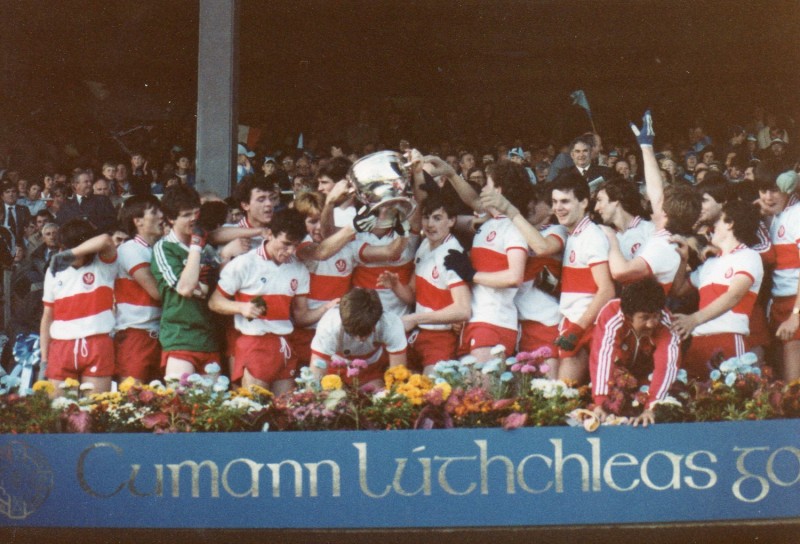
‘He didn’t lick it off a stone’ is a uniquely Irish way of explaining a man’s abilities traced back through his lineage. For a country obsessed with connections, reasoning Paul Bradley’s devotion to the GAA doesn’t take a lot of investigation. When John Bradley gifted lands to the St Mary’s club for the playing of Gaelic games prior to the purchase of John McLaughlin Park in 1978, the dye was cast.
However, the push that was needed came from elsewhere. An epicentre for a footballing revolution in the county in the mid-60’s, St Columb’s College gave Paul Bradly the platform to see further. The balance of power may have shifted south to St Pat’s Maghera, but exposure to top level schools football gave Bradley a desire for more.
“Tony Furey and Brian Trainor really had faith in me,” he reveals. Furey (from Buncrana) and Trainor, a former Derry senior captain and Doire Colmcille club man “pushed me on into county football at that stage” claims Bradley.
“For a young fella coming from Faughanvale where there wasn’t much history of playing county football, you really did need someone pushing you on, there to tell you that you’re as good as anyone else, so go for it.”
So he did.
Honoured in the inaugural set of Ulster colleges All-Stars and picked for the Derry minor panel under the tutelage of Eamonn Coleman, Bradley ran a tight ship from full back on a team that blazed its way to All-Ireland glory on September 18, 1983. On the day that Dublin collected 21st Sam Maguire, the Tom Markham Cup came north to Derry for the second time in the county’s history. The game ended: Derry 0-08 Cork 1-03 with the young full back having a ubiquitous role in the game’s only goal, as he explains:
“For some reason I was supremely confident going into the game (in ‘83). That wouldn’t naturally be the personality I’d have but for some reason I was confident in my own ability and in the team’s ability to come out on top. It was one of those games, particularly in the first half, where any ball that came in, there was no doubting that I wasn’t going to win it.
“I don’t have as vivid a memory of the second half but what I do remember is pulling my man down and conceding a penalty! There aren’t too many can say they conceded a penalty in an All-Ireland final. But I got away with it thankfully.
“But ’83 was brilliant,” exclaims Bradley. “It was all completely new to me, playing at that level.”
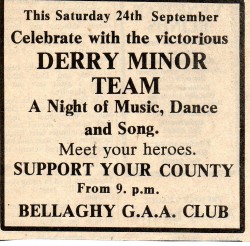
Playing alongside players like Damian Cassidy, Dermot McNicholl, Brian Kealy and Johnny McGurk are memories that Bradley still holds dear. His enthusiasm for the time is tangible and seems to pivot on the role of Coleman – a minor winner in 1965 himself – who had reinforced the message of Trainor and Furey in Bradley’s head, as he recalls:
“’You are as good as anyone else’, Eamonn always told us. “He was always driving you on. He never accepted that what you were doing was good enough. He always looked for that extra improvement. He would have found fault with you, but equally praised you for what you did right.
“There was no way that we weren’t going to have high targets. It wasn’t just to play matches, to represent the county. Our goal was to win the Ulster championship every year and then go forward into the All-Ireland.
“You were playing for him to a certain extent. You knew that if you didn’t produce your best, or come out on top with your man, then Eamonn would be there telling you that. He was always looking for more, always expecting better.”
And things did get better again. Picked to lead Derry minors in his second year – a team including Enda Gormley, Danny Quinn and Damian McCusker – Bradley took the Fr. Murray Cup home from Clones as an UIster-winning captain. Filtered through the lens of perspective, defeat to Galway in the All-Ireland semi-final didn’t leave a lasting sore, as Bradley reasons:
“That particular team punched above its weight, but it was Eamonn who got the best out of us. That was the hallmark of his unique skills.”
*****
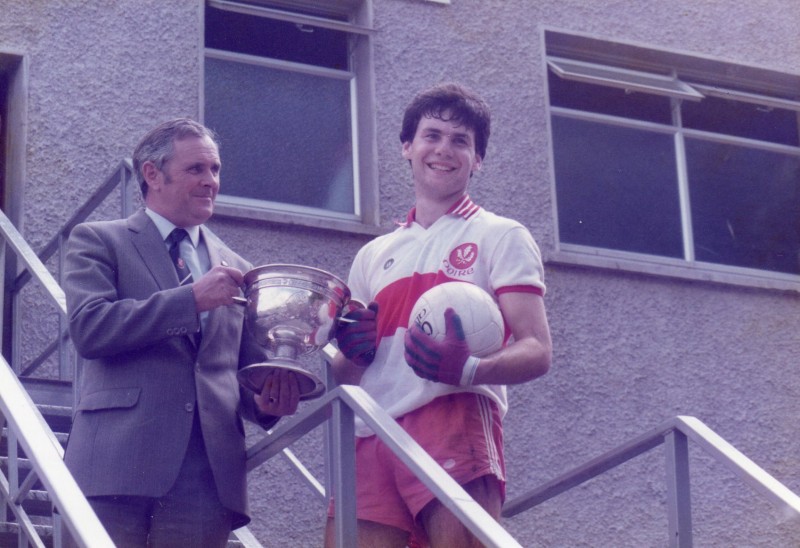
With the book snapped shut on his playing career Paul Bradley graduated from St Mary’s and was fortunate to find employment almost immediately. St John’s P.S. in the Creggan area of Derry City would be his base whilst he found his feet in the world again, a world outside of the playing of Gaelic football.
It was Faughanvale’s then senior manager, Seán O’Neill, who immediately recognised the opportunity that life’s path had lain down. A mind enriched by the teachings of Coleman, of Finn, of McKeever and Tom Scullion, and of Trainor and Furey, Paul Bradley had amassed a wealth of knowledge of Gaelic football and understood what made successful teams. O’Neill saw his chance and got his man. Drafted in as coach of the Faughanvale senior team, Bradley is quick to acknowledge another influence with close ties to the club at the time:
“We had great links with Mickey Moran at the time,” says Bradley, “who obviously went on to do great things himself. Mickey gave us pointers on how to lead teams and how to structure training. We took a lot from him and we did pretty well, all things considered.”
Coaching through the early nineties – a heady time in Derry football – Bradley and O’Neill took their team to the first division where they were more than competitive.
“We were competing with the likes of Lavey and Bellaghy who, at that stage, were hitting the mark at All-Ireland level,” states Bradley. “We finished in the top four of five places in division one and as I recall got within a few points of that Lavey team who went on to win the All-Ireland in ’91.”
The journey was fun while it lasted but as Bradley knew better than most, nothing lasts forever. Freshness and rejuvenation are the hallmark of any great team, or club, and it was a challenge that the St Mary’s club couldn’t meet at that particular time.
“By the end of the 1990’s as a senior manager I could see problems arising,” Bradley recalls. “We dropped down into the second division and then the third. We were leading an increasingly older band of players with very little young players coming through. It was an impossible challenge to keep producing results year in year out with the same group of players. Not only were the players getting older, but the younger players who were coming in just didn’t have the same attitude of appetite that was required in order to make their mark. That was the reason I decided to get involved in underage football.”
Of all the experiences: Croke Park, Clones, Sigerson, Senior Club, you get the strong impression that Paul Bradley is most at home when immersed in developing underage teams along the Lough Foyle shoreline.
“I’ve managed at all levels,” says the man who has also played at every level of the game. “I managed everything from our u6s right up to our seniors. It hasn’t been without its trials or its tribulations, and criticisms and everything else that goes with it, but definitely the good outweighs the bad.”
He possesses an immense knowledge of life, of what it takes to leave a mark. It’s a phrase he uses repeatedly: ‘Leave your mark’.
“I always remind our coaches of the following: experience is fantastic, but if you haven’t got the passion and the enthusiasm and the competitive will to succeed then you really are going nowhere. Young players these days are very quick to see that if you’re not as interested as they’d like to be, then they won’t be. If you’re enthusiastic and keen and out there for the right reasons, and making it enjoyable, then they’ll stand by you.”
As has now happened in Faughanvale.
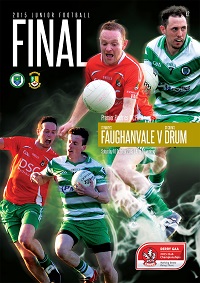
Winners of the Derry JFC in 2015, reaching the Ulster final, the St Mary’s club have done so largely with the players Paul Bradley introduced to the game as primary school pupils, moulding them into adulthood along the way. Over two thirds of the current club senior team on any given day in recent years is 21 or under. The mistakes of the past, not bringing freshness year on year, are no longer in evidence. It’s an impressive transition, framed by the foresight and dedication to make it happen.
“You’ve got to see the bigger picture at underage,” explains Bradley. “Sure, you get criticised along the side-line for results at times but I always stress the bigger picture. If we can bring two, three, four lads through the system every year then we’re achieving our goal. If we win a trophy or two along the way, that’ll be brilliant.”
One of Derry’s best kept secrets, perhaps by design, Paul Bradley is a hero as defined by Ashe.
“To be honest, I’m never one to blow my own trumpet,” he explains of his motivations. “My own family don’t know half of this. I have a cupboard full of medals and cuttings from every match I played in with Derry. I don’t talk about it around the club either, but occasionally people do bring it up to me; that if it weren’t for the injury I could have been playing in ’93. Who knows? That may or may not be the case. I don’t think you can look on things like that.
“To me the GAA is about what you put back into it rather than what you get out of it. I played for a short number of years and got a hell of a lot out of it. I have a cupboard here with Ulster, U21 and All-Ireland medals, Sigerson medals. There are guys here in the club who have toiled away for years with only a B championship medal to show for it. From that point of view I’ve a lot to be thankful for too.”
And for the future of his own club within his own county, Bradley has ideas about the next steps:
“I always compare ourselves in Faughanvale to the likes of Lavey, Bellaghy and Dungiven. They’re similarly sized areas.” He refers to role models and talks about figures that keep excellence in GAA culture alive; his beacons of example, pillars of discipline. In his own mind he’s clearly sketching out what makes teams and clubs great. After all, he’s been there, he’s done that.
He explains: “With Bellaghy you have the Diamonds and Danny Quinn, with Lavey you have the McGurks and the Downeys. At Faughanvale, we have nothing like that.”
Having spent a lifetime preaching his philosophy of the Derry footballer to all his teams, Eamonn Coleman wouldn’t have agreed with the last point.
‘You are as good as anyone else’.
Wise words.
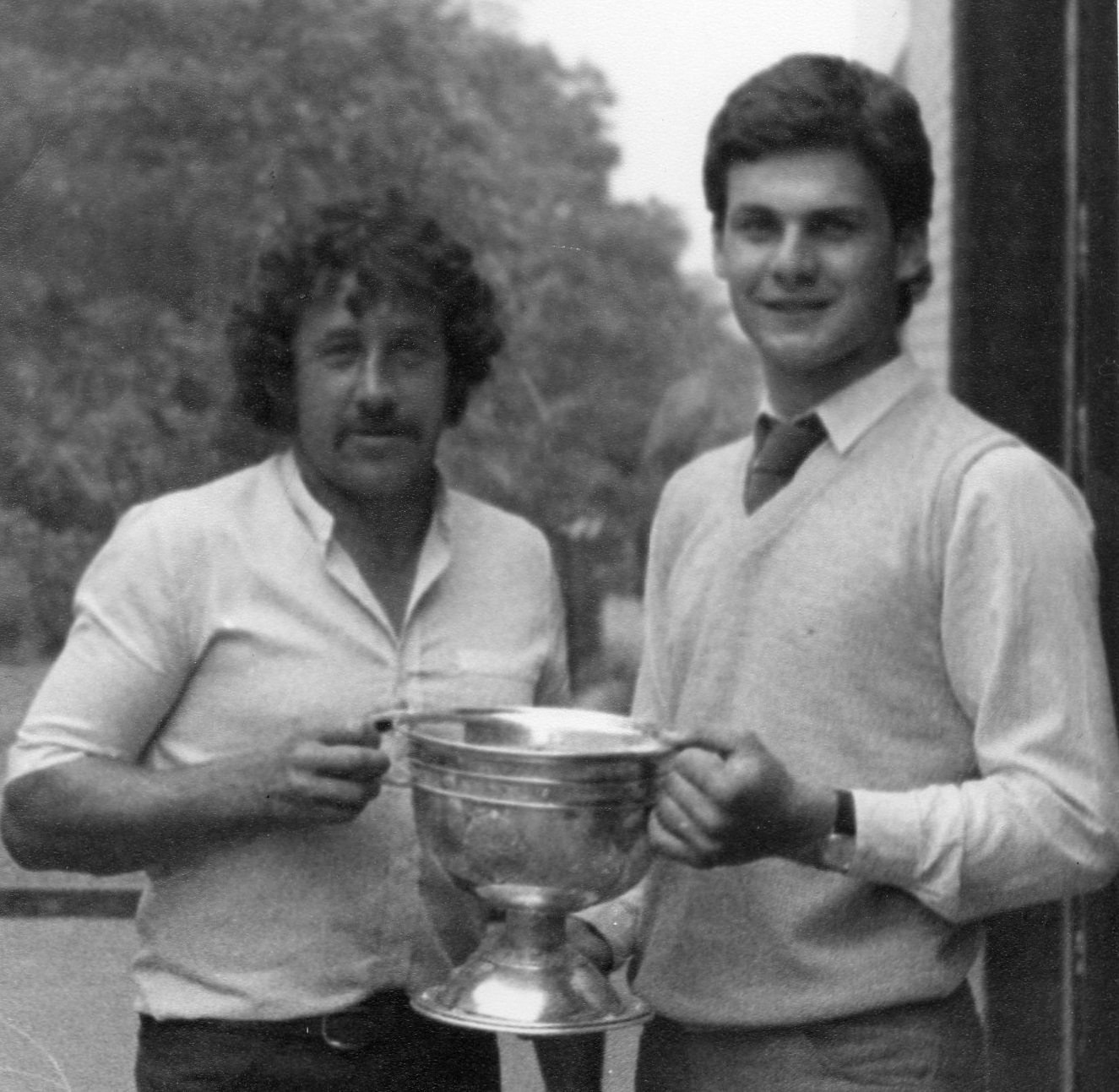
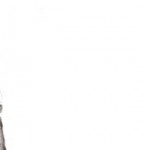
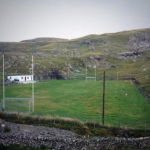
Comments